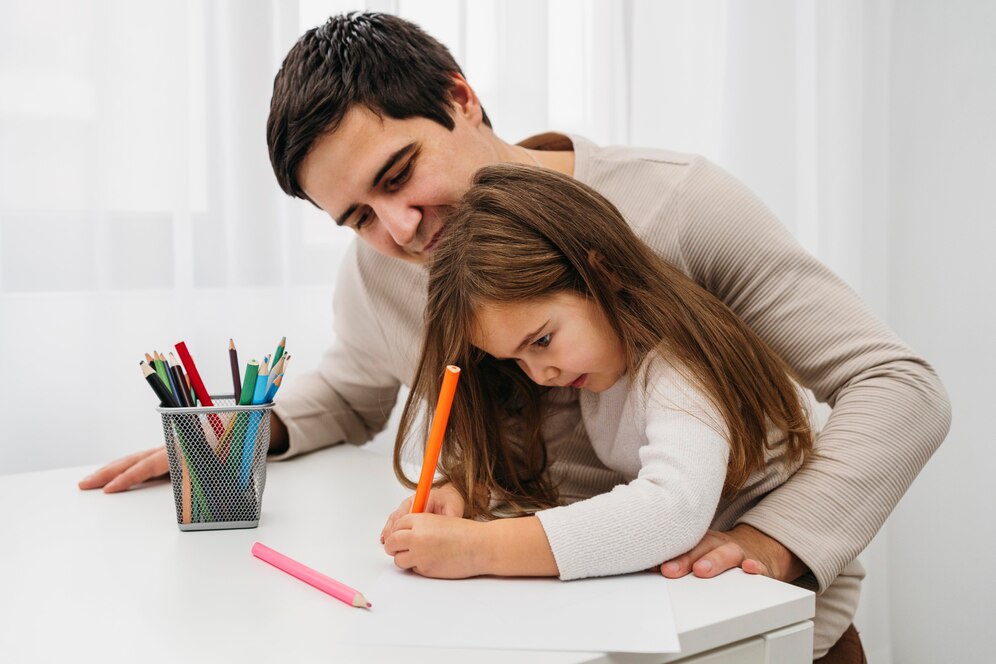
How to Start the Puberty Talk with Your Child
The Talk That Matters More Than You Think
You may have rehearsed it a hundred times in your head. You sit beside your child, take a deep breath, and say, “So… there’s something we should talk about.” Suddenly, you’re met with a blank stare, a cringe, or even a quick dash out of the room.
Talking about puberty doesn’t come naturally to most parents, and that’s okay.
But here’s the truth: how you start the puberty talk can shape your child’s relationship with their changing body, their self-esteem, and their ability to make healthy, informed choices.
This guide will help you:
- Understand when and how to start the conversation
- Learn practical puberty conversation tips
- Build confidence in offering parenting puberty advice
- Create a safe space for open, ongoing dialogue
Let’s break the silence and replace it with honesty, warmth, and trust.
Why Talking About Puberty Early Matters

The Puberty Window Is Getting Earlier
According to the NHS, girls are beginning puberty as early as 8, and boys from around 9. Waiting until “they’re ready” may actually mean missing the chance to prepare them.
Puberty brings:
- Physical changes (body hair, growth spurts, menstruation)
- Emotional upheaval (mood swings, self-consciousness)
- Social transitions (friendships, crushes, independence)
If you don’t provide accurate and empathetic information, someone else will — and that “someone” might be the internet, friends, or guesswork.
How to Know When It’s Time to Talk
There’s no “perfect” age, but here are signs your child is ready (and needs) to hear about puberty.
- They start asking questions like, “What’s a period?” or “Why do people use deodorant?”
- They show signs of puberty — e.g. body odour, breast buds, testicle enlargement
- They seem more private or self-conscious
- They hear or mention body-related terms from friends or the media
Start the conversation before signs begin. Think age 7–8 for girls, and 8–9 for boys, but adjust based on your child’s maturity.
The Biggest Myths Holding Parents Back
Let’s bust a few common misconceptions.
“They’ll ask when they’re ready.”
Many children don’t — out of fear, confusion, or embarrassment. They need you to initiate.
“I’ll just get them a book and be done.”
Books are great tools, but they don’t replace personalised, two-way conversations.
“If I bring it up, I’m encouraging them to grow up too fast.”
Actually, studies show that early, open discussions delay risky behaviour. Knowledge isn’t dangerous — it’s empowering.
Preparing Yourself Before the Conversation
Feeling nervous? You’re not alone. Here’s how to get ready:
1. Revisit Your Own Puberty Journey
What were you told? What weren’t you told? How did it make you feel?
Recognising your own experience can help you avoid passing on shame, discomfort, or misinformation.
2. Read Up
Brush up on basic puberty facts from trusted sources:
- NHS Health A-Z
- YoungMinds.org.uk
- Books like “It’s So Amazing!” or “Growing Up for Boys/Girls”
This ensures your information is factual, up to date, and inclusive.
3. Practice Talking Out Loud
Yes, really! Say the words: “breasts”, “penis”, “period”, “erection”, “hormones”. The more you normalise them, the less awkward you’ll feel — and the less awkward your child will feel.
How to Talk About Puberty: 7 Parent-Tested Tips

1. Start with Curiosity, Not a Lecture
Instead of diving into a monologue, ask:
- “Have your friends mentioned anything about puberty?”
- “Do you know what happens when your body starts to change?”
- “Have you ever had a question but weren’t sure how to ask?”
This invites them into a dialogue, not a lesson.
2. Use Real-Life Moments as Launch Pads
Seize everyday opportunities:
- Shopping for toiletries? Mention body changes and hygiene.
- Watching a film with a first kiss? Ask about feelings and boundaries.
- Sibling rivalry flaring up? Talk about emotional changes during puberty.
The less “formal” the setting, the more relaxed they’ll feel.
3. Use Clear, Age-Appropriate Language
For younger children:
“Your body will start to grow in new ways, like getting taller or starting to smell different. That’s called puberty.”
For older children:
“You might notice your voice changing or getting hair in new places. It’s part of how your body gets ready for adulthood.”
Avoid euphemisms or vagueness. Accurate names = confident kids.
4. Be Honest if You Feel Uncomfortable
Saying something like:
“This is a little awkward for me, too, but it’s really important, and I want us to be able to talk about anything.”
…shows vulnerability and trust. It makes the conversation more human.
5. Normalise Variation
Let your child know:
- Everyone’s body develops differently
- Some people get pimples early, others don’t
- Some grow fast, others slowly
- It’s all okay
This protects against body comparison and shame.
6. Introduce Emotional and Social Changes Too
Don’t just focus on the physical.
Talk about:
- Mood swings and how to manage them
- Friendships and how they may shift
- First crushes or questions about identity
7. Keep the Conversation Going
One talk is never enough. Revisit topics regularly. Ask:
- “Have you had any new questions since we talked?”
- “Is there anything you want to know more about?”
Practical Tools to Support the Conversation
- Books to Share: “Celebrate Your Body”, “What’s Going on Down There?”, “It’s Perfectly Normal”
- Videos or Animations: Look for content by BBC Bitesize or Amaze.org — fun, inclusive, and age-friendly.
- Puberty Starter Kit Put together a small pouch with:
- Deodorant
- Pads or pantyliners
- Gentle cleanser
- Hairbrush
- Confidence-boosting note
How to Handle Awkward Questions (Without Panicking)
Children can (and will) ask some curveballs. Here’s how to respond:
“What’s an erection?”
“It’s when the penis gets hard. That can happen when a boy’s body is growing and reacting to feelings or even just randomly. It’s normal.”
“Do girls get hair down there?”
“Yes, girls grow hair in new places like their underarms and around their genitals when they start puberty.”
“When will I get my period?”
“Usually between ages 9 and 13, but everyone’s different. I’ll help you prepare so you’re never caught off guard.”
If you don’t know the answer, it’s okay to say:
“Great question! Let’s find out together.”
Keeping the Tone Safe, Inclusive, and Positive
Puberty can feel scary if framed as a problem.
Instead, try to:
- Celebrate changes as signs of growth and maturity
- Avoid shame language (e.g. “gross”, “dirty”, “weird”)
- Be gender inclusive, acknowledging that not all children identify with traditional male/female roles
This builds long-term emotional safety and trust.
Common Parent Mistakes (and How to Avoid Them)

- Mistake: Talking too late.
- Solution: Start small, early, and revisit regularly
- Mistake: Avoiding “awkward” topics
- Solution: Say the words. Kids trust honesty over silence.
- Mistake: Focusing only on girls
- Solution: Boys need just as much guidance, especially around emotional and social changes
- Mistake: Assuming school will cover it all
- Solution: School helps, but your child needs your values, support, and context
Conclusion: Your Voice Is the One They’ll Remember
Starting the puberty conversation might feel like stepping into uncharted waters, but your presence, honesty, and care provide the compass your child needs.
Remember:
- Talk early and talk often
- Use real-life cues and open-ended questions
- Provide facts, empathy, and reassurance
You don’t need a perfect script. You just need the courage to show up, listen, and stay in the room — even when it gets a bit awkward.
Ready to Start the Conversation?
Have you already begun talking to your child about puberty? Share what worked for you — or what you’re still figuring out — in the comments. Subscribe for more parenting puberty advice and downloadable resources. Know a fellow parent feeling nervous? Share this guide to give them a confident start.


